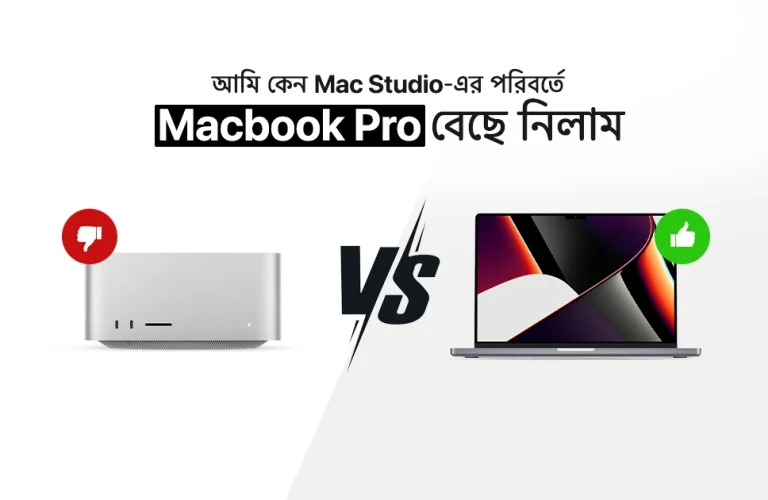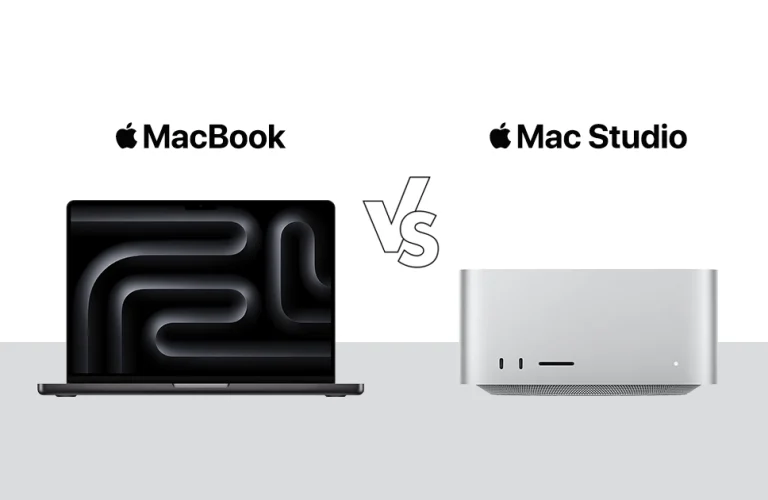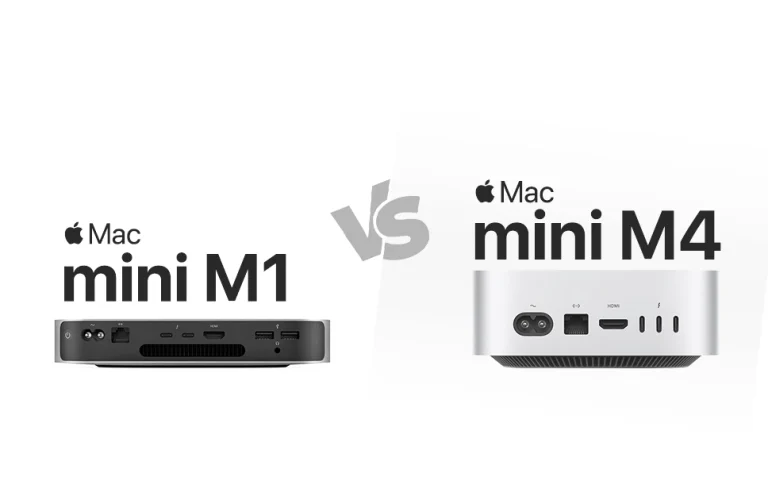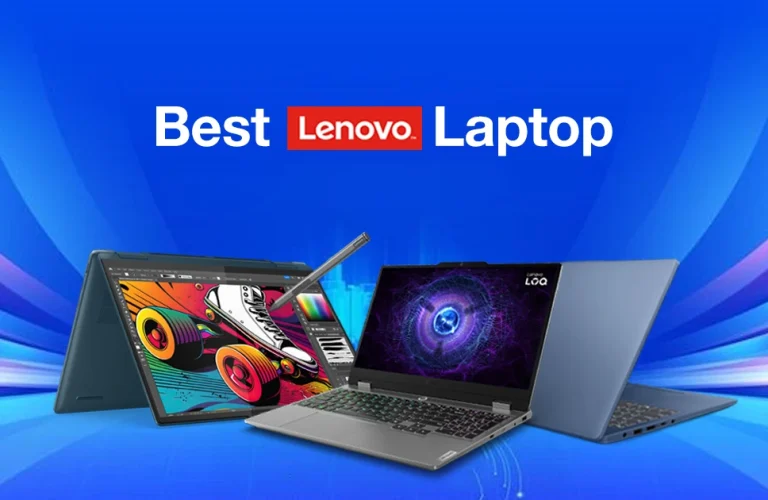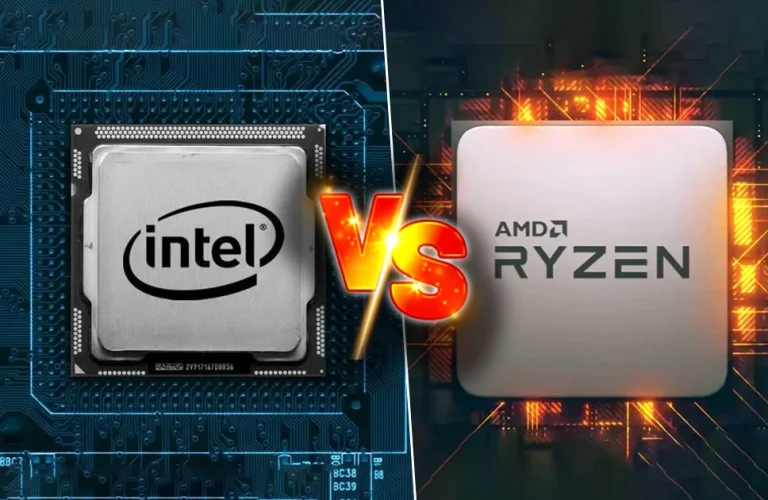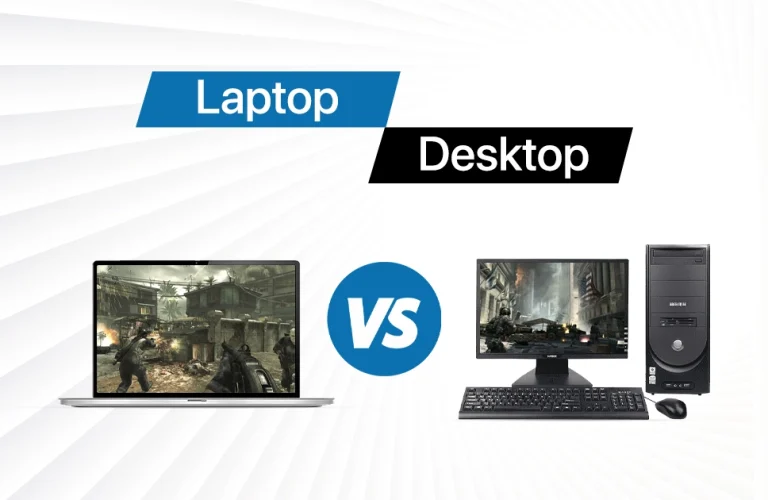Intel 14th gen vs 13th gen, What’s The Difference?
Is the latest Intel processor too pricey for you? No worries, it’s alright to pick last year’s or even earlier processor today. Gamers and Intel enthusiasts, the battle between the Intel 14th gen vs 13th gen is hotter than ever! Before you hit the “Buy now” button, and later regret it, you’ll want to know about which Intel’s generation upgrade is really worth it. Especially in terms of Bangladeshi gamers, who seek reliable performance and don’t want their money to get wasted, so making the ideal decision is crucial.
But why would you want to upgrade, really? Well, if you’re chasing those extra few FPS in games or need the absolute fastest processing speed for bragging rights, then sure, it makes sense. That is why today, we will dig a little deeper into both of the generation’s offerings and find out if it is a worthy upgrade or not. Let’s dive in:
What does Intel’s Core Naming Mean?
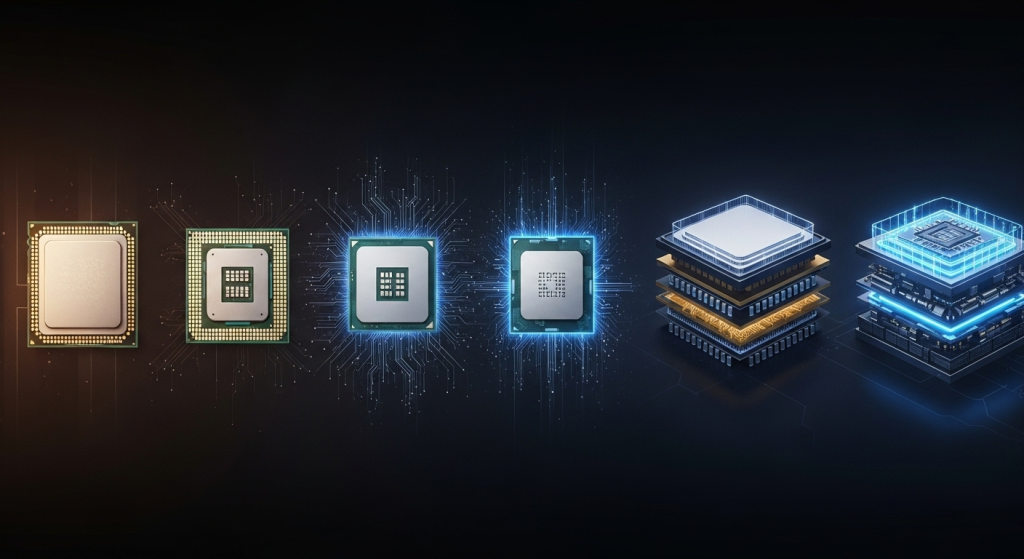
Intel started their journey in the early 1990s, they were the kings at that time through dominating the processor market with their most popular Pentium II and Pentium 4. Fast forward to 2006, Intel shifted their strategy to the Core series, starting with Core Duo.
In 2008 Intel released their very first generation of core processors, that is when this generation series started. Naming as Nehalem and introducing Core-i3, i5, and most powerful at that time the i7 series. You got hyper-threading technology and memory controllers, which brought major improvement in processors.
Eventually, Intel introduced newer generations, like Sandy Bridge, Ivy Bridge, Haswell, and Skylake, all of them offering improved performance, power efficiency and integrated graphics for handling day to day graphical tasks.
Later in 2017, Intel launched the Core-i9 series with Skylake-X delivering greater cores and reliable threads, which impressed high-end users. Today, Intel gives you the 14th generation with two distinct processors, one is the “Raptor Lake Refresh” and another one “Meteor Lake”, which is a newer architecture released at the same time.
From Intel Nehalem to today’s Core-i9, Intel was consistent with their advancement for providing improved power every year. Ensuring proper power for gamers, creators and professionals to be productive all the time.
You may also read – Best laptop Under 50000 Taka
13th Gen Announcement
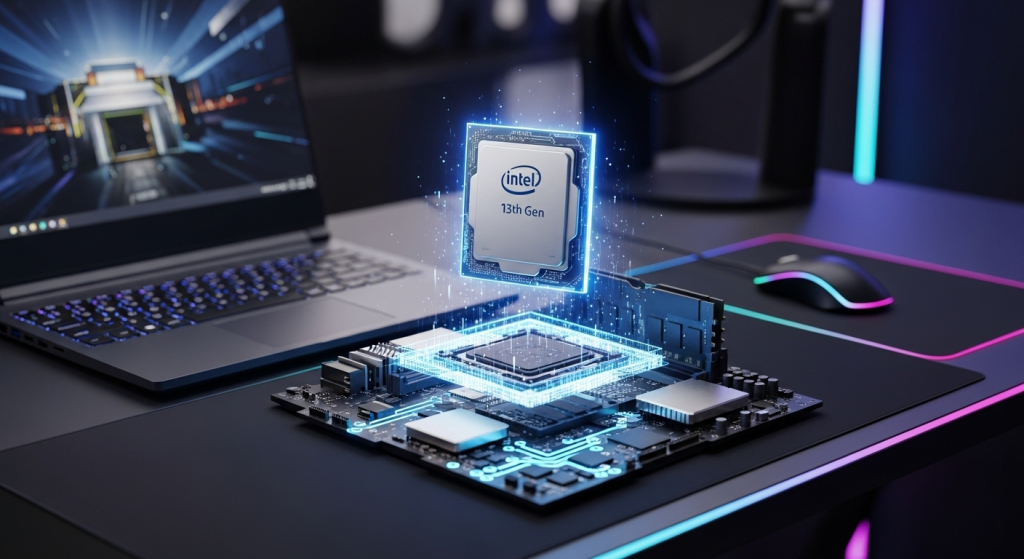
As we all know, the 11th gen from Intel was a bit of a disaster, and after gaining superiority back in with 12th gen and later 13th gen, Intel was more focused on gamers and content creators who required more power and processing. And if you are someone looking for a laptop with 13th gen processor, then do visit Vertech for getting a reliable laptop at the best price.
The cool part is that Intel kept support for both DDR4 and DDR5 RAM, giving people more flexibility depending on their budget or build goals. And in countries like Bangladesh the 13th Gen quickly became the golden pick for those who wanted powerful performance without breaking the bank.
The Arrival of 14th Gen
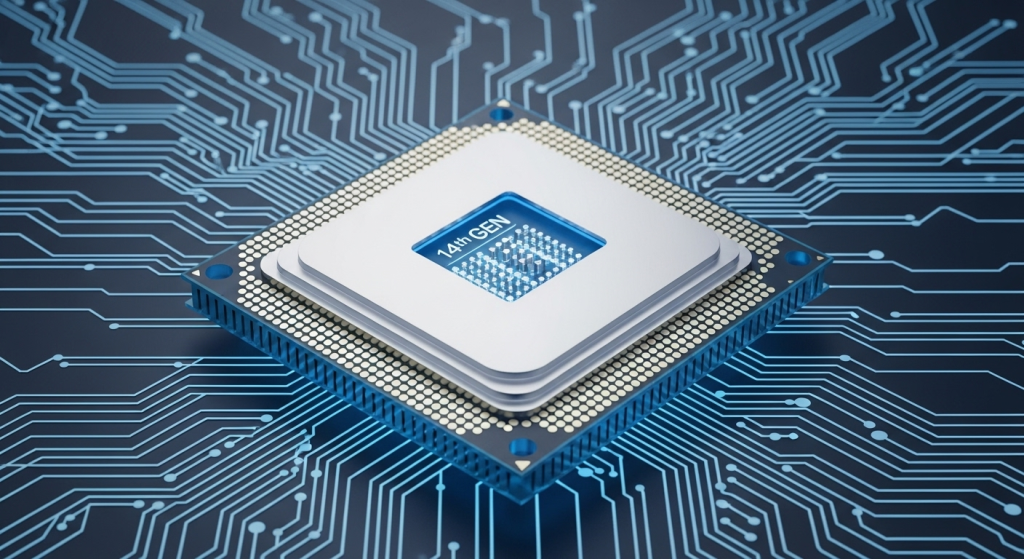
Fast forward to October 17, 2023, and Intel rolled out its 14th Generation Core processors. But here’s the thing to understand it more easily, the 14th Gen wasn’t a full-blown redesign. Instead, it was more like Intel took the awesome 13th Gen (Raptor Lake) and gave it a little extra polish. In other words, it’s the same solid architecture, just tuned even better with higher clock speeds and smarter chip selection.
For example, gamers and power users might squeeze a few extra frames or faster tasks out of the 14th Gen, but the overall experience feels very familiar. In short, for typical Intel fanboys especially in Bangladesh where getting value is everything. The choice really comes down to whether you want the newest shine or the already powerful 13th Gen at a better deal.
Main Differences Between Intel 14th Gen From 13th Gen
There are few differences seen from 13th gen to 14th gen in 2023. Intel did improve some noticeable changes with the name of “Raptor Lake Refresh”. I mean like a refreshed version of 2022’s CPU. To identify the differences more precisely, let’s check out the table down below:
| Feature | Intel 13th Gen (“Raptor Lake”) | Intel 14th Gen (“Raptor Lake Refresh”) | What’s the Difference |
| Architecture | Original Raptor Lake | Improved Raptor Lake | Slight architecture enhancement |
| Thermal Velocity Boost Upgrade | Only for KS special editions and i9-13900K supported | Same, but now with Thermal Velocity boost for i7 models too | TVB for i7 models |
| Base Clock Speeds | 3.00 GHz Base Clock Speed | 3.2 GHz Base Clock Speed | 0.2Ghz Increased Clock Speed |
| Supported RAM Types | DDR5, DDR4 | DDR5, DDR4 | No difference |
| Overclocking Features | Basic overclocking tools | AI Assisted Overclocking | Easier to overclock now |
| AI Acceleration | GNA 3.0 + Deep Learning Boost | GNA 3.0 + Deep Learning Boost | No difference |
| Intel Thread Director | Optimizes workload | Optimizes workload | No difference |
| Platform Compatibility | Intel 600/700 chipset | Intel 600/700 chipset | No difference |
| Wi-Fi Max Support | Wi-Fi 6E | Wi-Fi 7 | Improved Wi-Fi Speed |
| PCIe Support | PCIe 5.0 + PCIe 4.0 lanes | PCIe 5.0 + PCIe 4.0 lanes | No difference |
Now let’s take a look at key performance changes in detail.
You may also read – Best Gaming Laptops Under 60000 BDT
1. Performance Boost
From 13th gen’s “In the base clock speed, you will see slight improvement from Core-i9 13900’s 3.00GHz to 3.2GHz in Core i9’s 14900K. The 13th Gen (“Raptor Lake”) was already a big step over the 12th Gen, introducing more E-cores, better multi-core performance. And in last year’s 14th Gen, you got the “Raptor Lake Refresh”, which is not a completely new design; it’s mainly an optimized and faster version of the 13th Gen.
2. Noticed Architecture Changes
The 13th Gen was built on a newer architecture; it basically took the 12th Gen Alder Lake’s hybrid design and made it better. Then when the 14th Gen came out, it didn’t really bring anything drastically new. It’s actually using the same architecture as the 13th (Raptor Lake), just refreshed a little bit and no brand-new cores.
3. Product Strategy
When the 13th Gen came out, it introduced a bunch of new mobile series like HX, H, P, and U, each designed for different types of laptops. Then with the 14th Gen, Intel focused first on desktop chips around late 2023, you know, the usual i9, i7, i5, and i3 models. The mobile side, called Meteor Lake, came a bit later and was launched separately under the new Core Ultra branding.
The naming also changed for laptops. Instead of the traditional Core i5 or i7 names, they switched it up to Core Ultra 5, 7, and 9 for the mobile processors.
To tell you in summary, 13th Gen laptops used the traditional Core names, but with 14th Gen laptops, it moved to Core Ultra with a brand-new chiplet architecture.
4. Laptop Focus
| Feature | 13th Gen (2023) | 14th Gen (October, 2023) |
| Laptop CPUs | Core-i HX, H, P, U series | Core Ultra (new chiplet design) & HX-series (14th gen) for laptops only |
| Architecture | Raptor Lake | Raptor Lake Refresh (desktop) + Meteor Lake (mobile) |
| Performance | Big multi-core boost | Slight speed upgrade (desktop) + Laptop changes |
In 2023, 13th Gen laptops used the Core-i HX, H, P, and U series with Raptor Lake architecture, bringing a big boost in multi-core performance. Later that year, 14th Gen came with a slight speed upgrade for desktops and a big shift for laptops, introducing Core Ultra with a new chiplet design. Above all, desktops got a refreshed Raptor Lake, while laptops moved to the new Meteor Lake platform. By the way, if you are looking for a HX processor for your performance tasks, you can check out Lenovo LEGION 5 16IRX9.
Which One Is Right For YOU?
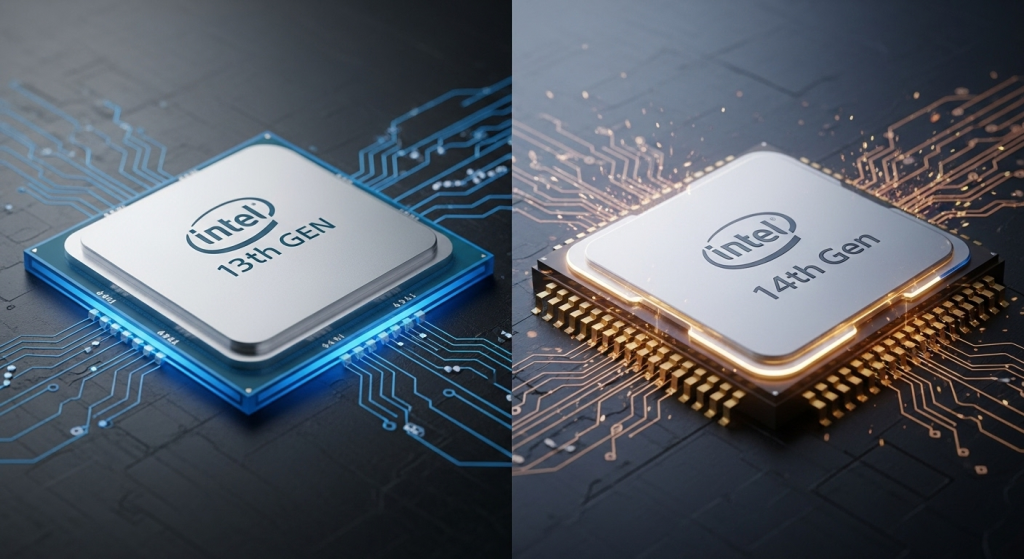
Choose 14th Gen
The truth is, the new 14th Gen is more like a fine-tuned remix than a brand-new album. Fun fact: it’s still using the same Raptor Lake architecture under the hood, just with slightly higher clock speeds and a few tweaks here and there.
Choose 13th Gen
And if you have a little less budget but don’t want to compromise performance, then Intel’s 13th Gen CPUs are still absolute monsters when it comes to gaming and multitasking. That is why you’re not exactly missing out if you stick with them.
Final Thoughts
And that’s pretty much about both of the Intel processors. The Intel 14th Gen isn’t some crazy leap over the 13th Gen, it’s more like a refined, slightly upgraded version of what we already had with Raptor Lake. You’ll notice a bit better performance, some small efficiency improvements, and just an overall smoother experience.
Although you might have to keep in mind something, which is you’re also paying a little extra for that polish and the refreshed branding. If you’re someone who wants the latest, needs that slight edge in workloads, or just loves having the newest tech, then the 14th Gen makes sense. It’s a solid upgrade if you’re willing to stretch your budget a bit.
On the flip side, if you’re looking for pure value for money and still want strong performance, the 13th Gen is absolutely still a beast. Either way, you’re getting a lot of reliable performance, it just depends on how much extra you want to squeeze out!

Rabbi Rahman enjoys talking about tech, gadgets and especially smartphones. He’s been writing about them for four years . His favorite topic is discussing innovations in devices, engaging in conversations with others who share his passion for technology.

